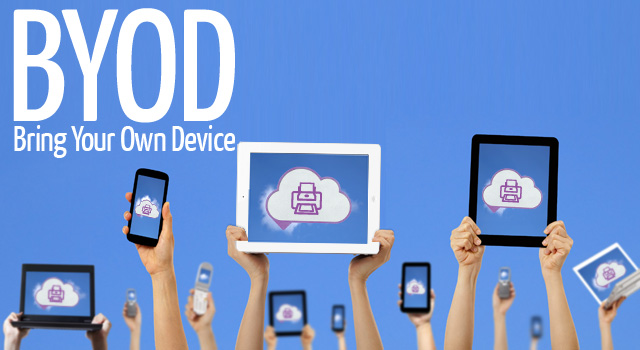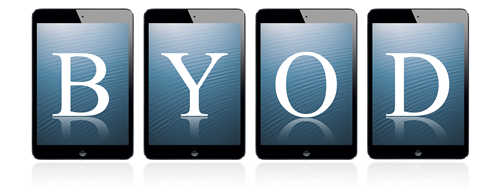BYOD (Bring Your Own Device)
-

Bring Your Own Device allows students, parents, staff, and guests to use their own wireless communication device (WCD) during the day to enhance the learning experience. Examples of the types of technology which can be used are Windows laptops/tablets, Mac laptops, Android tablets, and iPads.
What is BYOD?
-
A "wireless communication device" (WCD) is a device that emits an audible signal, vibrates, displays a message, or otherwise summons or delivers a communication to the possessor. The following devices are examples of WCDs: cellular and wireless telephones, pagers/beepers, personal digital assistants (PDAs), Smartphones, WiFi-enabled or broadband access devices, two-way radios or video broadcasting devices, laptops, and other devices that allow a person to record and/or transmit, on either a real-time or delayed basis, sound, video or still images, text, or other information.
Board members, employees, parents, members of the public, contractors, vendors, and agents of the Board ("users") may use their WCDs to access the Board’s approved resources/network, provided the User complies, without exception, with the established standards for appropriate use of the District's network. (See Policy 7540.03 - Use of Technology by Students, Policy 7540.04 - Use of Technology by Employees, and Policy 7543 - Remote Access to the District’s Resources/Network; and the Code of Student Conduct)
When an individual connects to and uses the District’s technology resources, s/he must agree to abide by all applicable policies, administrative guidelines and laws (e.g., the user will be presented with a "splash screen" that will set forth the terms and conditions under which s/he will be able to access the District’s technology resource(s); the user will need to accept the stated terms and conditions before being provided with access to the specified technology resource(s)).
In order to comply with the Children’s Internet Protection Act ("CIPA"), the Board utilizes technology protection measures that protect against (e.g., filter or block") access to visual displays/depictions/materials that are obscene, constitute child pornography, and/or are harmful to minors. The Board also utilizes software and/or hardware to monitor online activity to restrict access to child pornography and other material that is obscene, objectionable, inappropriate and/or harmful to minors.
Any user who violates the Board’s policies, or who accesses the network without authorization may be subject to disciplinary action, denial of access or cancellation of the contract with the Board.
Users are personally and solely responsible for the care and security of their personal WCDs. The Board assumes no responsibility for theft, loss, damage, or vandalism to WCDs brought onto its property or the unauthorized use of such devices.
The District is not responsible for providing troubleshooting or technical support for personal WCDs, even if they are being used for the purpose of direct student instruction.
BYOD Policy
-
Employee use of a personal WCD on Board property or at Board activities at school shall be in compliance with Employee policy 7542 -USE OF PERSONALLY-OWNED WIRELESS COMMUNICATION DEVICES
Student use of a personal WCD on Board property or at Board activities at school shall be in compliance with Student policy 136 - STUDENT USE OF PERSONALLY-OWNED WIRELESS COMMUNICATION DEVICES


